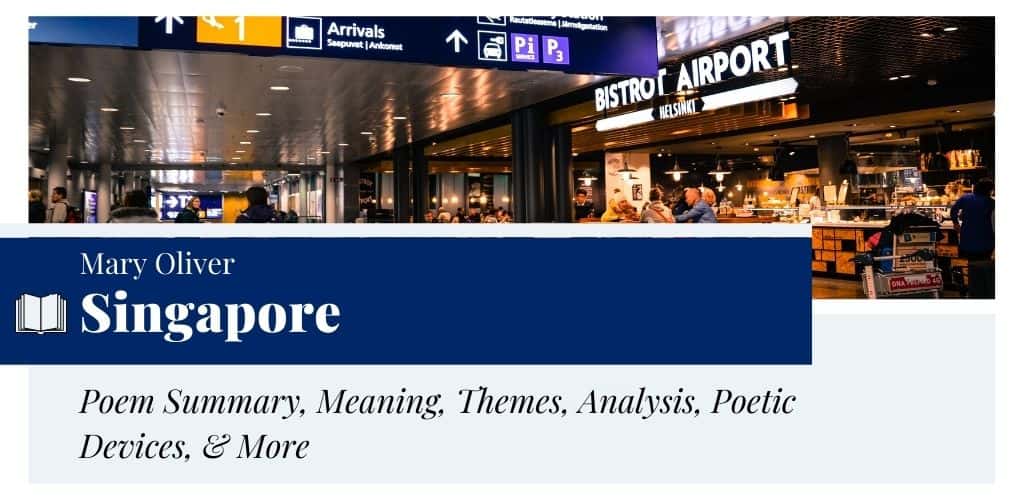Singapore by Mary Oliver
“Singapore” is written by the best-loved contemporary American poet, Mary Oliver. This poem is about a lady who washes the dirty airport ashtrays. Oliver’s persona discovers her in the ladies’ restroom where a compartment stood open. The scene makes her think how pitiful a woman’s life could be. Like her other poems, this piece is also filled with beautiful natural imagery and serene metaphors. The purpose of using nature is different in this poem. Oliver creates a contrast between the woman’s life and the liberating nature.
- Read the full text of “Singapore” below:
Singapore by Mary Oliver In Singapore, in the airport, a darkness was ripped from my eyes. In the women's restroom, one compartment stood open. A woman knelt there, washing something in the white bowl. Disgust argued in my stomach and I felt, in my pocket, for my ticket. A poem should always have birds in it. Kingfishers, say, with their bold eyes and gaudy wings. Rivers are pleasant, and of course trees. A waterfall, or if that's not possible, a fountain rising and falling. A person wants to stand in a happy place, in a poem. When the woman turned I could not answer her face. Her beauty and her embarrassment struggled together, and neither could win. She smiled and I smiled. What kind of nonsense is this? Everybody needs a job. Yes, a person wants to stand in a happy place, in a poem. But first we must watch her as she stares down at her labor, which is dull enough. She is washing the tops of the airport ashtrays, as big as hubcaps, with a blue rag. Her small hands turn the metal, scrubbing and rinsing. She does not work slowly, nor quickly, but like a river. Her dark hair is like the wing of a bird. I don't doubt for a moment that she loves her life. And I want her to rise up from the crust and the slop and fly down to the river. This probably won't happen. But maybe it will. If the world were only pain and logic, who would want it? Of course, it isn't. Neither do I mean anything miraculous, but only the light that can shine out of a life. I mean the way she unfolded and refolded the blue cloth, the way her smile was only for my sake; I mean the way this poem is filled with trees, and birds. - from House of Light (1990)

Summary
Oliver’s “Singapore” is set in an airport restroom. The speaker goes into the women’s restroom and comes across a disgusting scene in the other compartment. As the door stood open, she could notice a kneeling woman washing something in a white bowl. The scene makes her think that it cannot be a topic worth writing about. Her poem should explore the multitudinous beauty of nature that includes the kingfisher’s features, rivers, waterfall, etc. However, she thinks that this scene can also be beautiful for those who have the eye to see beyond the veil.
When the woman turned, both of them could say a word to each other. In the meantime, the speaker noticed that the lady was handsome. Her work was in stark contrast with her physical features. In the next lines, she sympathizes with the condition of the woman. She thinks, what if she could liberate the woman and take her to the river. The thought receded as it came. But, the woman’s smile reminded her of the fact that life was not all about pain and indignation. In the end, humanity triumphs through the innocent smile of the woman.
Meaning
The title of the poem does not disclose much about the main idea. It is a simple nod at the place where the narrative is set in. Oliver’s speaker narrates how she discovered a woman washing astray in the airport’s women’s restroom. She finds the lady’s smile quite fascinating. Besides, in this poem, she creates a contrast between the woman’s life and nature. She depicts how liberating natural beauty is.
In contrast, the woman’s condition reminds her of the harshness of life. Later on, she realizes the fact that the woman does not hate her work. She does what he has to do. It does not pollute the essential beauty in her heart. Through this poem, Oliver celebrates the inner beauty of humankind.
Structure & Form
Oliver’s “Singapore” is a narrative poem that directly begins with the scene. There is no description of the characters. The overall text consists of seven stanzas. There is no regularity in the line count of the stanzas. Besides, the poem is written in free-verse. It means there is no regular rhyme or meter. However, Oliver uses internal rhymings in a few instances. She writes the poem from the perspective of a first-person speaker. The speaker is none other than the poet herself. Apart from that, Oliver uses indentation in some stanzas for the sake of emphasis.
Poetic Devices
Readers can find the use of the following poetic devices in “Singapore.”
- Metaphor: In the line “a darkness was ripped from my eyes,” “darkness” is compared to clothes or something that can be ripped apart. Here, the “darkness” stands for one’s ignorance.
- Personification: The line “Disgust argued in my stomach” contains personification. Here, the feeling of “Disgust” is invested with the idea of arguing with the speaker.
- Imagery: In the third stanza, Oliver uses several natural images that include kingfishers’ bold eyes and gaudy wings, rivers, trees, a waterfall, and a fountain.
- Repetition: This device is used in a number of instances, meant for the sake of emphasis. For example, it occurs in “She smiled and I smiled.”
- Simile: It occurs in the following lines, “the airport ashtrays, as big as hubcaps,” “She does not work slowly, nor quickly, but like a river./ Her dark hair is like the wing of a bird,” etc.
- Alliteration: This device is used in “She smiled,” “she stares,” “don’t doubt,” “world were,” etc.
Stanza-by-Stanza Analysis & Explanation
Stanza One
In Singapore, in the airport,
a darkness was ripped from my eyes.
In the women’s restroom, one compartment stood open.
A woman knelt there, washing something
in the white bowl.
One of Mary Oliver’s well-known poems, “Singapore” begins with the scene of an airport. The speaker waited there for her flight. Later, she went to the women’s restroom. One compartment of the restroom stood open. She peeked through the door. A woman was kneeling and washing something in a white bowl. She was shocked by what she saw there. The woman who was working there was not meant to do such things.
It is evident in the line, “a darkness was ripped from my eyes.” Here, the “darkness” stands for the speaker’s ignorance. She was not aware of the fact that women performed such work at sophisticated places like the airport.
The scene literally ripped her view on humanity. Singapore is a developed city-state. There, women still have to do such work that the speaker talks about in the next lines.
Stanza Two
Disgust argued in my stomach
and I felt, in my pocket, for my ticket.
The second stanza only contains two lines. This stanza marks a shift in the poem. Here, the speaker describes her feelings after watching the woman working in the compartment. She was disgusted at what she was doing there. It was not the kind of work women should be doing in a developed country. Generally, people come across women performing such jobs in undeveloped areas.
Readers have to focus on the use of words in the first line of this stanza. She uses the terms “Disgust” and “argued.” This line hints at the fact that the speaker was not solely disgusted at the woman’s work. Rather, she was finding some arguments to justify the scene in her mind. Lastly, she managed to get rid of the thought and tried to search for her ticket in her pocket.
Stanza Three
A poem should always have birds in it.
Kingfishers, say, with their bold eyes and gaudy wings.
Rivers are pleasant, and of course trees.
A waterfall, or if that’s not possible, a fountain
rising and falling.
A person wants to stand in a happy place, in a poem.
The third stanza is the conventions of Romantic poetry. In such poems, readers notice birds such as Kingfishers attributed with colorful metaphors. There are rivers babbling with a pleasant tone and trees. She depicts an image of a waterfall in the next line.
If readers don’t find these images in romantic poems, they can find a fountain, at least. It is important to note the indentation used in the fifth line. It makes readers emphasize the verbs “rising” and “falling.” Here, Oliver uses kinesthetic imagery to convey the movement of the fountain water.
The last line of this stanza is about the purpose of reading romantic poetry. Readers want to find themselves happy in the freeing world of poetry. But, Oliver’s “Singapore” is not that kind of a poem. So, readers have to be cautious as they cannot find themselves in a happy state after finishing the text. In reality, this is not the case with this poem. They have to wait till the end to discover the twist in the poet’s thought process.
Stanza Four
When the woman turned I could not answer her face.
Her beauty and her embarrassment struggled together, and
neither could win.
She smiled and I smiled. What kind of nonsense is this?
Everybody needs a job.
In the fourth stanza, the speaker returns to the actual scene. While she was standing at the compartment door, the lady turned and glanced at her. The speaker couldn’t answer the question painted on her face. She could comprehend the question from her facial expression. The woman was going to ask how she could help her.
In the next line, the poet connects two words, “beauty” and “embarrassment,” with the verb “struggled.” It is an example of zeugma. Here, the terms are connected with the verb in different senses. This line refers to the contrast between the woman’s features and her work. She was embarrassed as the speaker had discovered her job.
They both smiled at each other. The woman’s smile implies that she did not like her job, but she had to do it. Her smile made the speaker feel annoyed with herself. Everyone has to do something for a living. The woman in the compartment was also doing her job. If she hadn’t any issues with that, the speaker should not need to have nonsensical thoughts.
Stanza Five
Yes, a person wants to stand in a happy place, in a poem.
But first we must watch her as she stares down at her labor,
which is dull enough.
She is washing the tops of the airport ashtrays, as big as
hubcaps, with a blue rag.
Her small hands turn the metal, scrubbing and rinsing.
She does not work slowly, nor quickly, but like a river.
Her dark hair is like the wing of a bird.
In this stanza of “Singapore,” Oliver sympathizes with the condition of the woman. The first line begins with an affirmation. She accepts that a person seeks a happy place in a poem. However, readers also have to consider the work the woman was doing. It is not that the speaker was annoyed at her work. Even the woman herself stared down at her labor. She knew she was not meant to do this work in the airport.
Washing the tops of airport ashtrays is undoubtedly dull and disgusting work. These trays were as big as car hubcaps. Besides, she rinsed the trays with a blue rag.
In the next lines, Oliver describes how the woman washed the ashtrays. With her small hands, she scrubbed and rinsed the metal. She was not too slow or quick. Her pace resembled the flow of a river. Her dark hair waved like a bird’s wing. In this way, Oliver uses images from nature to describe the features of the lady.
Stanza Six
I don’t doubt for a moment that she loves her life.
And I want her to rise up from the crust and the slop
and fly down to the river.
This probably won’t happen.
But maybe it will.
If the world were only pain and logic, who would want it?
In this section, too, Oliver admits the fact that the woman loves her life. Though she likes her life, she might not like her job in the airport. So, Oliver’s persona wants her to rise from the “crust.” Here, the term “crust” symbolizes the lowly work. The term “slop” also hints at a similar idea.
The speaker wants to take her out of the filth surrounding her and fly down to a river. Right next, her concern is that it may not happen. However, there is a chance that she opts to move out. No matter what, the speaker sympathizes with the woman’s condition and wants to help her out.
The following line contains a rhetorical question. Here, the poet asks whether the world is only filled with pain and logic. If that is the case, none would want to live in this world.
Stanza Seven
Of course, it isn’t.
Neither do I mean anything miraculous, but only
the light that can shine out of a life. I mean
the way she unfolded and refolded the blue cloth,
the way her smile was only for my sake; I mean
the way this poem is filled with trees, and birds.
In the last stanza of “Singapore,” Oliver uses the same format. In the previous stanzas, she ends a stanza with an interrogation. Readers can find the answers to her own query in the opening line of the next stanza. Here, she reaffirms that the world is not all about suffering. It is not filled with harsh, logical explanations of the human condition.
Moreover, by saying the world is not what it appears to be, the speaker does not mean the world is a miraculous place. She only believes in the light that shines out of humanity. It enlightens the voids in our hearts. This light wants us to believe in humanity.
The last three lines of this stanza begin with the phrase “the way.” It is a use of anaphora. By repeating the same word in each line, the speaker tries to sound more appealing and effective. In these lines, she talks about how the woman folded the blue cloth and how she smiled back at her. Though she was doing dull work, she was doing it wholeheartedly. Besides, the work did not draw out the essence of humanity from her heart. She even smiled back at the speaker while working.
According to the speaker, this scene is as beautiful and as soothing as a poem filled with images of trees and birds. In this way, Oliver describes that one can find inspiration from simple human gestures. The little acts of humanity can be as liberating as nature.
Themes
Oliver’s “Singapore” taps on a number of themes that include humanity, nature, inspiration, gender role, and life. In this poem, Oliver talks about an incident that happened with her in an airport in Singapore. She was in the women’s restroom. There, she came across a woman who was washing dirty airport ashtrays with due diligence and care. In the short encounter, they smiled at each other. Through this story, the poet explores various themes. At first, she contrasts the woman’s condition with nature. Further, she talks about the beauty of simple human acts like smiling and doing one’s work diligently. Lastly, the poet describes how the encounter was as freeing as going into nature.
Historical Context
Mary Oliver’s poem “Singapore” was first published in the June 1988 issue of the Poetry magazine, published by the Poetry Foundation. Later the poem was included in her book of poetry, House of Light, published in 1990. Oliver won two awards for this collection. In general, her poetry is inspired by nature instead of the human world. However, in this poem, she takes inspiration from a woman who worked at an airport in Singapore. She contrasts the woman’s life with nature in the first few sections. Then, she glorifies the former and describes how the woman is the inspiration of her poem.
Questions & Answers
The main idea of “Singapore” by Mary Oliver revolves around the basic essence of humanity. In this poem, Oliver celebrates simple human acts such as smiling back at a stranger and doing one’s work with due diligence.
The speaker of this poem is Mary Oliver herself. She uses the first-person point of view in order to share the incident that happened with her in an airport in Singapore.
The poem was first published in Poetry magazine in June 1988. Later, it was published in Oliver’s award-winning collection, House of Light (1990).
The tone of this poem is thoughtful, sincere, compassionate, and interrogative. In the first few lines, the tone of the speaker is filled with disgust and annoyance. Later, the tone changes to a calm and thoughtful one.
Similar Poems about Nature & Humanity
- “The Awakening” by James Weldon Johnson — This poem is about the spiritual awakening of a speaker after he discovers the god’s presence in nature.
- “The Orphan Girl” by Henry Derozio — In this poem, the poet sympathizes with an orphan girl’s condition and describes how she was redeemed.
- “A child said, What is the grass?” by Walt Whitman — This poem describes the meaning of the grass and explores its significance in the natural world.
- “The Woman” by Kristina Rungano — This poem is about the pitiful condition of women in rural Zimbabwean society.
External Resources
- Check out Devotions: The Selected Poems of Mary Oliver — Explore the latest and last Mary Oliver collection, which includes a wide array of poems curated by the poet herself.
- The Poem Aloud — Listen to a reading of Mary Oliver’s “Singapore.”
- Of Looking, and Looking: On Mary Oliver — Read this tribute to the poet who died on January 17, 2019, at the age of 83.
- About Mary Oliver — Learn about the poet’s life and her poems.





This is a wonderful website! I just discovered you this morning, and the very existence of such a thorough explanation of a poem derives from a bright place in human life reminding me that we as humankind are indeed capable of understanding and compassion.